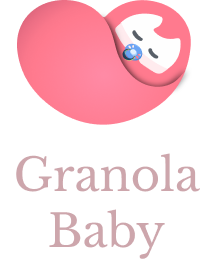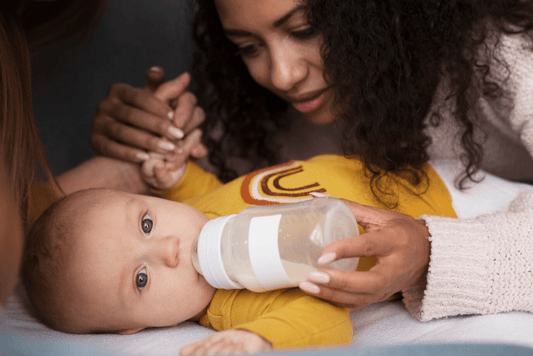You don't need to worry about teaching your baby how to play. Just let her explore and have fun on her own, wiggling, giggling, and playing with anything she can get her hands on, especially after the first two months. Have you ever wondered why babies are naturally drawn to play?
Well, play is actually incredibly important for your baby's overall development, including physical, cognitive, social, emotional, and language skills. As a parent, you can help support all of these areas by engaging in sensory activities with your little one. For instance, chatting about animal toys while playing with them in the grass can encourage your baby to start babbling.
Playing is a fantastic way to stimulate your baby's brain and support her development in many different ways. In this article, we will explore how play can specifically enhance your baby's language skills and suggest some fun activities for you to try together.
How can play support language development?
Your little one needs to play, it's a crucial part of their learning and development! It's not just about having fun, but also about exploring and understanding the world around them. As your baby grows, you'll see how their play evolves from simple exploration to imaginative experiments, where they mix different things together to see what happens.
These playful moments will lead to unforgettable memories of your child pretending to be a serious cupcake-dinosaur doctor-magician, spinning fantastical tales that might only make sense to them. But before they can become a master storyteller, they need to spend a lot of time observing and listening in their first year of life.
Language development is closely linked to other areas of a child's growth, and play is a perfect way to support all of these aspects at once.
Engaging in play involves using all of our senses
When it comes to helping your little one develop language skills in their first year, baby sensory activities are key. These activities allow your baby to explore the world around them through their senses like taste, touch, smell, sound, and sight.
Sensory activities can be as simple as playing with toys in water or enjoying a baby book with different textures and colors. Remember, it's important not to overwhelm your baby's senses.
The market is full of flashy toys that might grab your baby's attention, but they aren't necessary. Newborns and even older babies don't need overwhelming toys or TV shows.
Instead of bombarding your baby with electronic gadgets, let them learn at their own pace with classic toys and sensory activities. By focusing on a few senses at a time, your baby is truly immersing themselves in the world and learning naturally.
Playing helps to improve cognitive skills
Playing is crucial for a baby's brain growth, learning abilities, and focusing skills, which are all important for her future endeavors. This applies to various animal species as well.
For baby animals, playtime is key for picking up essential survival skills like hunting, escaping, and hiding. It's a time for them to be adventurous, test out different scenarios, investigate their surroundings, and learn about their own capabilities.
While human babies might not be leaping from trees during playtime, they are busy pushing boundaries, exploring their environment, and trying out new things. Babies pay close attention to their parents' reactions, tone of voice, expressions, and body language. Between seven to twelve months old, babies start to understand several words and simple instructions, but they are also keenly attuned to your emotions and gestures.
Spending quality time playing and chatting with your baby is a direct investment in her language skills. The more she hears you talk about things she can see or touch, the more it will benefit her language development in the long run.
Playing is a great way to help kids grow socially and emotionally
Play is super important for the growth of human babies, toddlers, young children, and even animals that like to play. Playing without words is also a great way to help with social and emotional development.
In the beginning, smiling, cuddling, singing, and chatting with your newborn are the building blocks of their social life. These actions make them feel secure and loved, even when they're upset.
As your baby's brain grows and learns new things every day, you'll see them becoming more vocal and looking for your attention with sounds. When they start babbling and asking for your focus, it's the start of their communication skills taking off!
When your baby turns into a toddler and starts using some words, you'll see a change in their playtime. They'll start creating scenarios with their toys or with others, which pumps up their language and thinking abilities. Their vocabulary will grow along with their creativity!
Here are 7 awesome baby activities to encourage language development!
Playtime with babies is far from trivial - it's actually quite important! So, how can parents make sure they are playing with their little ones in a productive way to give them the best start in life?
Engaging in sensory activities and games with babies can be entertaining, stimulate different senses, and encourage them to start communicating. Here are seven of my favorite baby activities that not only brought joy but also helped my little one start babbling!
1. Bang Bang!
This game was a hit with my little ones when they were around six months old. At this age, babies love banging things together, so why not turn it into a fun game filled with silly faces, babbling, and lots of giggles?
If your baby isn't sitting up yet, no worries! You can prop them up in a seat, a high chair with a tray, or hold them up yourself. Gather a few blocks, a ball, and a toy hammer and place them in front of your little one. Show them how the blocks make noise when you bang them together or hit them with the hammer.
Get into the excitement: make a goofy face, cover your ears, and shout "Bang!" However, if your baby hits the ball, try a softer sound like "bump!" Your baby will likely catch on fast and have a blast creating all that fun noise and silliness.
2. Go Ball!
For this activity, you can use any type of hand-sized ball, but I personally prefer using a racquetball. Once your little one reaches four months of age, you can start rolling the ball towards them while saying, "Go ball!" By the time they are between six and eight months old, they may start grabbing the ball and throwing or rolling it back to you.

As your baby gets more engaged, you can get creative by setting up a little obstacle course for the ball or placing a target at the end of a hallway. Playing this game together is so exciting and enjoyable! It's great for improving their hand-eye coordination, motor skills, and even learning new words like "ball," "uh-oh," and "go." Give it a try and have a blast with your little one!
3. Look Away
This game is a great way to have fun with your baby. It may start off quietly, but soon enough you'll both be laughing and enjoying yourselves. Some babies can start playing this game as early as eight months old, while others might need a bit more time to catch on.
To start, just look at your baby and make a silly sound while she's busy doing her thing. If she doesn't notice you, keep making sounds, gradually getting louder until she looks your way. As soon as she makes eye contact, look away with a goofy face. When she looks down again, wait for her to look back at you.
Keep exchanging funny faces and sounds until she catches you looking at her directly. Then simply say, "You got me!" and celebrate together. Keep the game light and playful, and enjoy these special moments with your little one.
4. Where Am I?
Let's talk about playing hide-and-seek with babies! It can be a fun game for little ones, even though they might not fully understand the rules at first. For babies under a year old, you can keep it simple by hiding somewhere they can easily find you and then happily exclaiming, "Where am I?" when they come looking.

When your baby discovers your hiding spot, pop out and cheer, "Yay! You found me!" or "Here I am!" Celebrate their cleverness and watch them giggle with joy. It won't be long before they're eagerly anticipating the game every time you ask, "Where am I?"
A little tip I like to share is to hide in a spot where you can still keep an eye on your baby. This way, you can make sure they stay safe and also avoid hiding too well. Have fun playing hide-and-seek with your little one!
5. Elevator
Let's play a fun game to help develop your baby's language skills! You can start by either holding your baby or putting her in a baby carrier. Then, pick a direction or preposition, point that way, and take three steps while counting aloud.
For instance, you could say "left," point your baby's hand to the left, and count the steps together. Then, try "up," point your baby's hand upward, and stand tall. The next step might be "down," point her hand downward, and crouch down.
As your baby catches on to the hand gestures, she will likely start to gesture directions herself and may even start babbling along. Encourage her by using the correct direction names. And if she playfully leads you into a wall, come up with silly ways to "crash" together. Have fun playing and learning!
6. Read and Find
You've probably noticed by now that your little one has favorite books that they want to read over and over again. It's all part of their learning process, but let's face it, it can get a bit repetitive for us too! So why not switch things up a bit?

For babies under nine months old, you can try naming colors and objects as you point to them in the pictures. Since they have short attention spans at this age, you can mix it up by singing the words, using funny voices, or guiding their tiny fingers to the pictures.
If your baby is almost one year old and enjoys reading, you can start engaging them more actively by asking them to find things in the pictures as you read. You can also have fun by pretending to fall asleep mid-story, reading really fast, or dramatically slowing down your reading pace.
7. Zoo
My little ones had a ton of stuffed animals, so I came up with a fun game for them once they turned nine months old. I turned their room into a zoo! It's super easy to do, especially if you've recently visited a zoo or watched a cute animal video.
Group all the stuffed animals of the same kind together. Have one group in the crib, another under the crib, one in a dresser drawer, and so on. Then, you can talk about the animals, their names, how to care for them, and which ones get along well.
If your little one grabs one of the animals, you can playfully say, "Oh no! The lion (or whichever animal) is loose! Run!" and pretend to run away or catch it.
At first, your baby might be a bit confused by all the fun, but this game could become a favorite as they grow into a toddler who loves animals.
To put it simply,
Playing with your baby is super important for their language development, so go ahead and have fun together as much as possible! Making silly faces, using repetitive phrases, and getting a little goofy with your body language all help nurture your little one's imagination and playful spirit.
And if anyone gives you a hard time for being playful with your baby, just remember you're actually helping them grow and succeed in the long run. That'll definitely surprise them!




